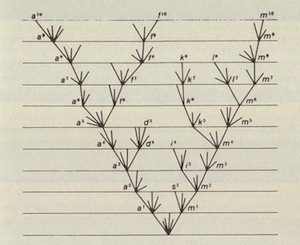 Pinker & Bloom‘s 1990 BBS paper was timely and influential but it begged the most controversial question about language evolution.
Pinker & Bloom‘s 1990 BBS paper was timely and influential but it begged the most controversial question about language evolution.
It is uncontroversial that “language” (whatever that may be) evolved through natural selection as well as through learning, culture and historical change. What was controversial was whether the specific capacity underlying universal grammar (UG) could have evolved in that way.
The problem P & B overlooked was the “poverty of the stimulus” — the fact that what the language learning child hears and says does not provide enough data for either the child or any learning device to learn to recognize and produce all and only the utterances that conform to the rules of UG.
The rules of UG are not known (except by linguists) and are hence not taught explicitly to the child; and they are too complex for the child to learn by trial and error induction from the impoverished evidence available to it during its language learning years. How would evolution have “induced” the rules of UG, or the mechanism for recognizing and producing all and only the utterances that conform to those rules?
This question is especially troubling since there has so far been no evidence or argument suggesting that the rules of UG are somehow optimal or even necessary for language in principle. It seems they are just necessary (and universal) in practice.
But none of this was addressed in P & B’s 1990 BBS paper. Their basic suggestion was that the evolution of language was an unproblematic combination of traits that could plausibly have evolved biologically, and other traits that evolved culturally.
Now, if worries about the problematic evolutionary status of UG were holding language researchers back from working on the unproblematic evolutionary and cultural aspects of language, then P & B performed a great service by dispelling those worries.
But they certainly did not solve or dispel the problem of the origin of UG.
